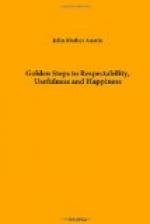“How then can religion be otherwise than pleasant, when it is the exercise of the noble faculties of the mind, upon the sublimest topics of mental investigation; the voluntary, excursive, endless pursuits of the human understanding in the region of eternal truth. Never was there a more interesting or important inquiry than that proposed by Pilate to the illustrious Prisoner at his bar; and if the latter thought it not proper to answer it, it was not to show that the question was insignificant, but to condemn the light and flippant manner in which a subject so important was taken up. Religion can answer the question, and with an ecstasy greater than that of the ancient Mathematician, exclaims, ’I have found it: I have found it.’ The Bible is not only true, but TRUTH. It contains that which deserves this sublime emphasis. It settles the disputes of ages, and of philosophers, and makes known what is truth, and where it is to be found. It brings us from amongst the quicksands and shelves, and rocks of skepticism, ignorance, and error, and shows us that goodly land, in quest of which myriads of minds have sailed, and multitudes have been wrecked; and religion is setting our foot on this shore, and dwelling in the region of eternal truth.
“2. That a religious life is pleasant, is evident from the nature of religion itself.
“Religion is a principle of spiritual life in the soul. Now all the exercises and acts of vitality are agreeable. To see, to hear, to taste, to walk, are all agreeable, because they are the voluntary energies of inward life. So religion, in all its duties, is the exercise of a living principle in the soul: it is a new spiritual existence. Piety is a spiritual taste. Hence it is said, ’If so be ye have tasted that the Lord is gracious.’ No matter what the object of a taste is, the exercises of it are always agreeable. The painter goes with delight to his picture; the musician to his instrument; the sculptor to his bust; because they have a taste for these pursuits. The same feeling of delight attends the Christian to the exercises of godliness: and this is his language, ’It is a good thing to give thanks, and to draw near to God. O how I love thy law! it is sweeter to my taste than honey. How amiable are thy tabernacles.’ Religion, where it is real, is the natural element of a Christian; and every creature rejoices in its own appropriate sphere. If you consider true piety with disgust, as a hard, unnatural, involuntary thing, you are totally ignorant of its nature, entirely destitute of its influence, and no wonder you cannot attach to it the idea of pleasure: but viewing it as it ought to be viewed, in the light of a new nature, you will perceive that it admits of most exalted delight.
“3. Consider the miseries which it prevents.




